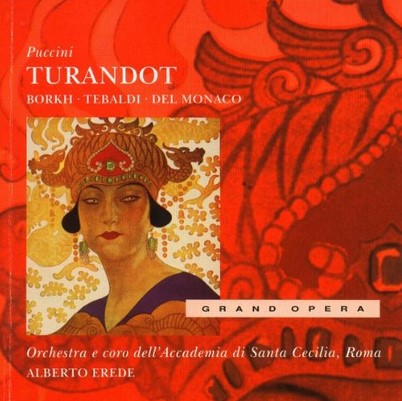
Director: James Levine
Interpretes:
- Luciano Pavarotti (Ernani)
- Jean Kraft (Giovanna)
- Rugero Raimondi (Silva)
- Sherrill Milnes (Don Carlo)
- Leona Mitchell (Elvira)
Comentarios
Complete cast:
Iréne Theorin, Turandot,
Leah Crocetto, Liu,
Marco Berti, Calaf
Raymond Aceto, Timur
Hyung Yun, Ping
Greg Fedderly, Pang
Daniel Montenegro, Pong
Joseph Frank, Altoum
Ryan Kuster, Mandarin.
Turandot doesn’t sing a note until the middle of the second act in the opera that bears her name, making what is probably the longest-delayed entrance of any title character in the standard repertoire. On Friday night, the results were worth the wait.
Making her company debut in the San Francisco Opera’s season-opening revival of Puccini’s unfinished final masterpiece, Swedish soprano Iréne Theorin provided a reminder of just how alluring this icy Chinese princess can seem when her music is sung with grandeur, depth and emotional vigor. A role that is too often delivered in piercing shrieks turned into a showcase for vocal expressiveness and even subtlety.
And Theorin’s performance was only one of a number of impressive turns in an evening that got the season off to a powerful and dramatic start. A strong cast, performing under the impassioned if not always disciplined leadership of music director Nicola Luisotti, conspired to give this production a welcome air of urgency.
That urgency can sometimes be hard to come by in “Turandot,” whose dramatic failings are patent even by operatic standards. It requires us to care about the emotional state of a bloodthirsty tyrant who subjects her many suitors to a life-or-death game of riddles – and to celebrate along with her and her ultimate betrothed as they join hands across the corpse of his faithful servant Liù.
Theorin helped that happen, with a vocally rounded and dramatically responsive performance. Her big opening aria, “In questa reggia,” sounded both shapely and imposing, even as she veered off pitch once or twice; her final acquiescence in Act 3 was improbably compelling.
As Calaf, the Tartar prince who doggedly pursues her hand, tenor Marco Berti displayed a muscular, warm and often beautiful vocal gift along with an almost complete lack of theatrical life.
Berti may move and emote like a block of wood, but his singing – not only in the famous “Nessun dorma” but throughout the first two acts as well – was vital and often thrilling.
Yet perhaps the biggest excitement of the evening came from soprano Leah Crocetto, an Adler Fellow whose future stardom has never been in doubt. As the selfless Liù, Crocetto combined elegant phrasing (especially in the lyrical Act 1 aria “Signore, ascolta”) with vaunting power.
Ping, Pang and Pong, the clownish government functionaries, were sung vividly but not very precisely by Hyung Yun, Greg Fedderly and Daniel Montenegro. Bass Raymond Aceto gave a sonorous, affecting performance as Timur, Calaf’s blind and aged father.
Ian Robertson’s Opera Chorus dispatched its large assignment superbly, especially in the ever-changing choral scenes of Act 1. There were good contributions too from Adler Fellow Ryan Kuster (Mandarin) and Joseph Frank (the Emperor).
The nightmarish red-and-black swoops and curves of David Hockney’s sets have given the company good service over the years, but with this revival, directed by Garnett Bruce, the seams have finally begun to show. It’s probably mothball time at last.
(Edited from the SF Opera Review; SF Gate)
